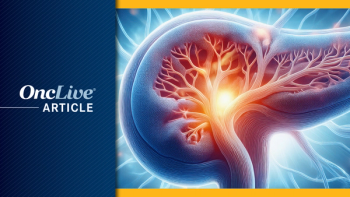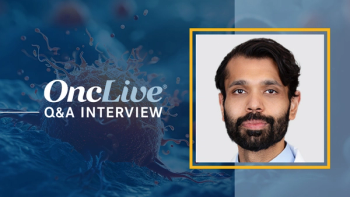
First-in-Human T-Cell Therapy Warrants Further Investigation in HCC
New data showing efficacy and tolerability with ADP-A2AFP, alpha-fetoprotein–directed specific peptide enhanced affinity receptor T-cells, suggest that further research evaluating the 5 billion or more cell dosing regimen is warranted in hepatocellular carcinoma.
“In HCC, we have been living with only 1 systemic therapy for more than a decade: sorafenib [Nexavar],” said Sangro. “Now, we have other TKIs, particularly immuno-oncology agents, in both the first-line and second-line [settings]. These agents have absolutely changed the field, but it is nice to see different tools like T-cell therapy making their way into clinical research in HCC to meet the unmet needs our patients have.”
During the 2020 Digital International Liver Congress (ILC), findings from multiple cohorts of a first-in-human phase 1 trial (NCT03132792) evaluating ADP-A2AFP were presented in patients with HCC or other AFP-expressing cancers who are not amenable to transplant, resection, or locoregional treatment, and who failed on, were intolerant to, or refused standard therapy.2,3 The results demonstrated 1 complete response (CR) with sustained serum AFP reduction among 4 patients treated with the 5 billion or more cell dose of autologous, genetically modified cells.2
In addition to the single CR, the other 8 patients treated with ADP-A2AFP SPEAR T cells had stable disease (n = 6) or progressive disease (n = 2).2,3
Additionally, ADP-A2AFP was associated with an acceptable toxicity profile. No evidence of significant T-cell related hepatotoxicity or protocol-defined dose-limiting toxicities were observed with the infusion.2,3
In an interview with OncLive, Sangro, director of the Liver Unit at Clínica Universidad de Navarra and a professor of medicine at the Clínica Universidad de Navarra School of Medicine in Pamplona, Spain, expanded on the findings from the phase 1 trial of ADP-A2AFP and spoke to the next steps with this research in the HCC space.
OncLive: How are T-cell receptor cells designed to target AFP?
Sangro: SPEAR T cells are engineered T-cell receptor cells. The lymphocytes that are able to attack tumors cells have receptors that are able to scan other cells. Whenever they find a receptor that matches their own receptor, they are able to engage and kill the engaged tumor cell. This happens in humans, and in particular, in patients with cancer.
However, to exploit this ability of T cells, one can modify these T-cell receptors in the laboratory so that they are able to engage with specific antigens of tumor cells with very high affinity.
That is exactly what SPEAR T cells are about. These cells are engineered so that they can target AFP in this case, presented in an A2A molecule of a tumor cell.
Some HCC tumors express a significant amount of the AFP antigens. For patients who have increased expression of AFP, [modifying] their own cells so that they can identify and attack their tumor cells could be a meaningful way of treating their cancer. That is exactly what the ADP-A2AFP trial is about.
How was this trial designed, and what inclusion criteria informed which patients were eligible for enrollment?
In this trial, patients could be treated, provided they met 2 main inclusion criteria. Patients had to be Human Leukocyte Antigen (HLA) compatible so that the modified T cells could identify AFP in perfect context. Secondly, patients had to express AFP. If these inclusion criteria were met, patients went into leukapheresis to extract their own lymphocytes. Then, in the lab, the [SPEAR] T cells were selected and engineered, the new cells were manufactured, and finally they were shipped back to the hospital. When the cells were received by the hospital, a lymphodepleting combination of cyclophosphamide and fludarabine was provided to the patient as a conditioning regimen to allow the cells that would be infused to persist for a long period of time in the patient’s body.
In this trial, 3 different doses of cells were injected. Three different cohorts (1, 2, and 3) were included, and upon confirmation of the safety in these cohorts, an expansion cohort was added.
[During the 2020 Digital ILC], we presented the results of cohorts 1, 2, and 3, as well as the findings from 1 patient in the expansion cohort. In total, [we presented] the safety and efficacy data of 9 patients.
Did anything surprise you with regard to the safety of the modified cells?
The main thing in an early development clinical trial is, of course, safety. We were happy to confirm that the treatment was by and large, very well tolerated. Most adverse effects (AEs) were consistent with [previously reported findings] of patients with cancer receiving chemotherapy as a conditioning regimen. AEs were mostly hematologic and transient in nature. Only a few patients needed specific treatment for these AEs. Also, very importantly, there were no signs of off-target AEs, meaning the cells [did not] recognize AFP on normal liver cells, which would lead to hepatitis. There were no events of relevant hepatitis.
This provides reassurance of the safety of this type of therapy in patients with cirrhosis with reduced [hepatic] functional reserve.
Did ADP-A2AFP demonstrate sufficient proof of efficacy to move forward in development?
In terms of efficacy, stable disease was the best response in 2 and 3 patients in cohorts 1 and 2, respectively. Among the 4 patients treated with the highest dose of cells, [in] cohort 3 and the expansion cohort, 1 patient had stable disease and 2 patients had progressive disease. However, 1 patient achieved a CR. This patient had limited burden of disease with very high peripheral levels of AFP, which dropped in a significant way after treatment and normalized. On the CT scan, we were able to observe the complete disappearance of all treated tumor lesions. The CR has lasted for more than 6 months. By the time of these analyses, the patient had unconfirmed tumor progression with new nodules but no progression in prior sites.
Overall, this serves as a proof of concept that these AFP-targeted autologous T cells are able to recognize, engage, and kill AFP-expressing tumor cells.
These findings mean that the trial has to continue recruitment. We need data on a larger series of patients treated with the highest dose of 5 billion cells. I should point out that it was only with the highest number of cells that we were able to observe persistence in terms of the transduced cells in the peripheral blood of the patient. This is the dose of cells that has to be investigated. Now, we need to have a larger series of patients to further confirm whether these responses are frequent and durable. Ideally, we could provide insight on [optimal] patient selection for this type of T-cell therapy.
References
- Promising data from phase 1 trial with ADP-A2AFP in liver cancer at the International Liver Congress confirm safety profile and demonstrate potential benefit for patients. Adaptimmune. News release. August 28, 2020. Accessed October 7, 2020. https://bit.ly/36J9qdg
- Sangro B, Borad MJ, Hausner PF, et al. Data from the third dose cohort of an ongoing study with ADP-A2AFP SPEAR T cells. Presented at: 2020 Digital International Liver Congress; August 27-29, 2020; Virtual. Abstract LBO12.
- Meyer T, Sangro B, Mahipal A, et al. Updated data from an ongoing study with ADP-A2AFP spear T-cells. Presented at: 2020 Digital International Liver Congress; August 27-29, 2020; Virtual. Abstract SAT513.



































